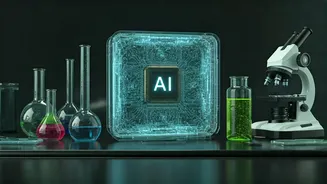Basic Task Mastery
The study undertaken by IIT Delhi and FSU Jena highlighted a notable achievement of leading AI models: their aptitude in handling elementary tasks. These
AI systems demonstrated a high level of proficiency in performing tasks that constitute basic functionalities. These could include activities like information retrieval, basic data processing, and pattern recognition. This signifies that AI has made significant strides in mimicking human capabilities in straightforward situations, offering efficient and rapid execution of fundamental functions. The researchers observed that these models are designed with architecture and training parameters which enable them to excel in these foundational areas. This enables the AI to execute straightforward procedures with remarkable speed and precision, setting a solid basis for more complicated applications in the future.
Scientific Reasoning Challenges
In contrast to their competence in simple tasks, the study also exposed a substantial weakness in AI models: their difficulties in tackling scientific reasoning. The researchers observed that when confronted with complex scientific concepts, data, and the necessity for critical evaluation, AI performance dropped noticeably. The models' capacity to infer, analyze, and draw scientifically accurate conclusions based on the information supplied was found to be severely constrained. The study's results indicated that these AI models lacked the sophisticated cognitive abilities necessary to handle the complexities of scientific reasoning, such as forming hypotheses, designing experiments, and analyzing scientific data. This represents a significant obstacle in leveraging AI for scientific research and application, highlighting a gap in AI's comprehension of intricate, scientific principles.
Implications and Limitations
The study's findings have significant ramifications, particularly in areas where scientific reasoning is crucial. For instance, in fields such as lab safety and scientific research, the shortcomings of AI models are clear. AI systems that are unable to accurately interpret scientific data or make sound judgments based on it might be dangerous in lab settings. Additionally, in the realm of scientific research, the inability of AI models to reason effectively hinders their usefulness in tasks such as developing innovative hypotheses, analyzing results, and speeding up scientific breakthroughs. The study emphasizes the need for improvements in AI development to bridge this gap, encouraging further study into enhancing AI's capacity for scientific reasoning to overcome these limitations. The study also implies a careful approach to AI adoption, particularly in contexts where scientific precision is vital.
Future Research Pathways
The study opens up intriguing avenues for further study in AI. Researchers are motivated to explore innovative methods to improve AI's scientific reasoning abilities, given the results' implications. Possible research routes include designing AI architectures and training methodologies explicitly focused on improving complex cognitive abilities. This encompasses the inclusion of more sophisticated methods for data analysis, inference, and critical thinking. Investigating hybrid models that combine AI with human intelligence is also a promising area. These models might benefit from the AI's speed and human experts' scientific experience. Furthermore, the development of new testing procedures and benchmarks to properly evaluate AI's scientific reasoning skills is vital. Addressing these challenges would be a significant step toward developing AI that can reason scientifically.
Broader Educational Impact
The research underscores the broader implications for education, particularly in the context of AI literacy. The fact that current AI models struggle with scientific reasoning highlights the necessity of developing educational approaches that encourage critical thinking, analytical abilities, and scientific understanding in both students and professionals. This suggests a need to revise existing curricula and teaching methods to include more emphasis on these essential abilities. Preparing the next generation to understand AI's strengths and weaknesses and to engage with AI systems in a responsible and knowledgeable way is critical. Education should concentrate on giving people the skills necessary to comprehend scientific concepts, evaluate data objectively, and apply critical reasoning. By doing so, people will be better equipped to utilize AI's benefits while navigating its limitations. The study's implications underscore the need to equip people with the knowledge to utilize AI tools.
















